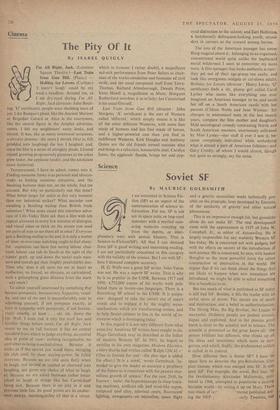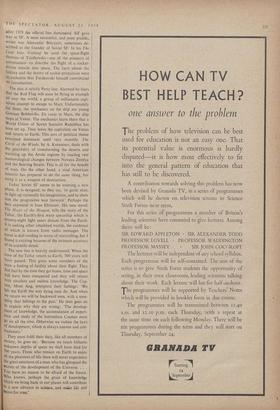Science
Soviet SF
By MAURICE GOLDSMITH
H. G. Wells was a great SiF writer. Jules Verne was not. He was a superb SF writer. That is why he is so popUlar in the USSR. Between 1917 and 1950, 4,752,000 copies of .his works wefe pub- lished there in twenty-one languages. There is a flourishing SF school in the USSR. It is purpo- sive: designed to take the oxcart out of men's minds and to replace it by the mighty servo- mechanisms which are transforming nature, and to help Soviet citizens to live in the world of to- morrow which is developing today.
In this regard it is not very different from what some key American SF writers have sought to do. Hugo Gernsback may he described as the father of modern Western SF. In 1911, he began to serialise in his own magazine, Modern Electric's, a story that he had written called 'Ralph 124C41 +' ('One to foresee for one'—the plus sign is added for effect.) 'It is a novel,' wrote Gernsback, 'in- tended to give the reader as accurate a prophecy of the future as is consistent with the present mar- vellous growth of science.' For the year 2660, he foresaw : radar, the hypnobioscope (a sleep-learn- ing machine), artificial silk and wool-like rayon, rustproof steel alloy, televised opera, fluorescent lighting, newspapers on microfilm, space flight
and a gravity neutraliser made technically pos- sible on the principle, later developed by Einstein, of the similarity of gravity and other natural phenomena.
This is an impressive enough list, but gimmicks alone do not make SF. The real development came with the appointment in 1937 of John W. Campbell, Jr., as editor of Astounding. He is largely responsible for any maturity Western SF has today. He is concerned not with gadgets, but with the effects on society of the introduction of new science. He is concerned, he says, with human thoughts as the most powerful force for either construction or destruction in the world. He argues that if we can think about the things that are likely to happen when new inventions are introduced, we might be able to select something that is beneficial to us.
But too much of what is published as SF today is still bad SiF. Besides, it fills the reader with an awful sense of doom. The stories are of death and destruction, and a belief in authoritarianism. The Strong Man, the Big Brother, the Leader is successful. Ordinary people are pushed around, duped and exploited. And in the process great harm is done to the scientist and to science. 1 he scientist is presented as the great know-all : the person brilliant but different, who thinks up all the ideas and inventions which seem so dan- gerous, and which, tidally, the professional soldier is called in to control.
How different then is Soviet SF? I have no space here to describe the pre-Revolution Uto- pian fantasy which was merged into SF. It wag poor SiF. For example, the novel, Red Star. 11 the revolutionary Alexander Malinovski, pub- lished in 1908, attempted to popularise a coming Socialist world—by s2lting it up on Mars. There
was much of co-' ' 'aterest published dur- ing the NEP ; early Twenties, but
after 1929 the official line dominated. SiF gave way to SF. A most successful, and most prolific, writer was Alexander Belyayev, sometimes de- scribed as the founder of Soviet SF. In his The Leap Into Nothing he used the space-flight theories of Tsiolkovski—one of the pioneers of astronautics—to describe the flight of a rocket- driven missile into space. The facts about the Galaxy and the theory of rocket propulsion were so authentic that Tsiolkovski himself contributed an introduction.
The plot is strictly Party line. Alarmed by fears that the Red Flag will soon be flying in triumph all over the world, a group of millionaire capi- talists attempt to escape to Mars. Unfortunately for them, the mechanics on the ship are young German Bolsheviks. En route to Mars, the ship stops at Venus. The mechanics learn there that a World Union of Soviet Socialist Republics has been set up. They leave the capitalists on Venus and return to Earth. This sort of political theme remained dominant until very recently. The Circle of the Winds, by A. Kazantsev, deals with the possibility of transforming the deserts and warming up the Arctic regions by causing vast meteorological changes between Novaya Zemlya and the Gehring Straits: This is all for the benefit of man. On the other hand, a mad American scientist has prepared to do the same thing, but using it as a weapon of destruction.
Today Soviet SF seems to be entering a new Phase. It is designed, so they say, `to guide man, to light up rationally his imagination, and to show him the progressive way forward.' Perhaps the best exponent is Ivan Efremov. His new novel, The Heart of the Dragon, tells the story of the Tellur, the Earth's first warp spaceship which is seventy-eight light years distant from the Earth. It is seeking other inhabited worlds, the existence of which is known from radio messages. The novel is dull reading in terms of storytelling, but I found it exciting because of the intimate accuracy of its scientific detail.
The new line is heavily underscored. When the crew of the Tellur return to Earth, 700 years will have passed. This gives some members of the crew a feeling of futility about their flight. They feel that by the time they get home, time and space will have been conquered and they will return With obsolete and useless knowledge. The Cap- tain, Moot Ang, interprets their feelings: 'We left the Earth the way dying men do. And when we return we will be backward men, with a men- tality that belongs to the past.' He then goes on to explain why they are wrong: 'The develop- ment of knowledge, the accumulation of experi- ence and study of the bottomless Cosmos must go on all the time. Otherwise we violate the laws Of development, which is always uneven and con- tradictory.'
They must fulfil their duty, like all members of society, he goes on : 'Because we reach hitherto Unknown depths of space we shall have died for 700 years. Those who remain on Earth to enjoy all the pleasures of life there will never experience the great emotions of a man who has glimpsed the Secrets of the development of the Universe. . . . You have no_reason to be afraid of the future. Who knows, perhaps the grain of knowledge Which we bring back to our planet will contribute to a new advance in science, and make life still better for man.



































 Previous page
Previous page